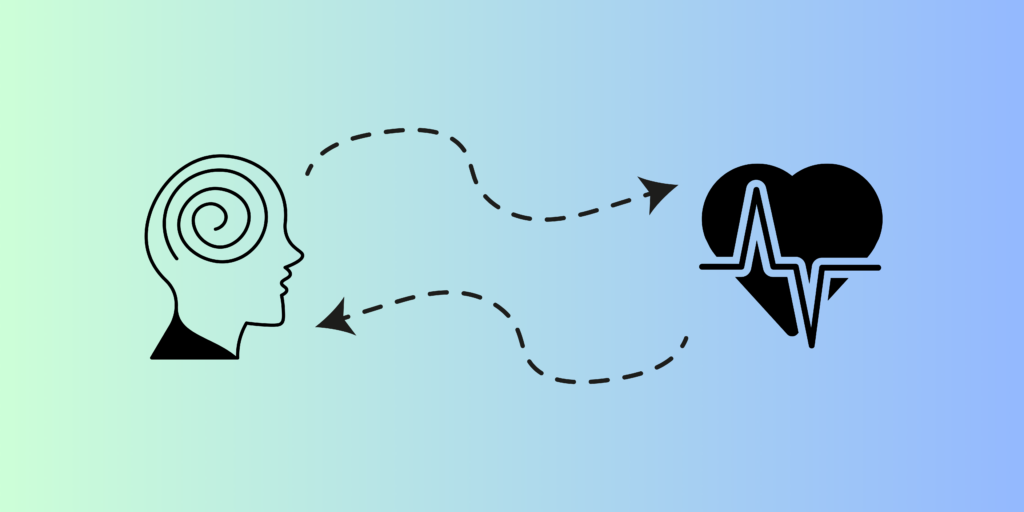
The Inextricable Link Between Physical and Mental Health: A Holistic Approach to Wellness
In the pursuit of overall well-being, it is crucial to understand and recognise the intricate connection between physical and mental health. While the connection between the mind and body is often underestimated, the two are interwoven facets of overall wellness. Nevertheless, research reveals that those with mental health problems are more likely to have preventable physical health conditions like heart disease. In this blog, you will explore how mental health problems can take a toll on your physical health and vice versa. Furthermore, you will explore remarkable tips that will help you to stay on top of your health. Give it a read!
But before delving deeper into these, firstly understand the inextricable mind-body connection!
The Mind-Body Connection: Impact of Mental Health on Physical Health
The connection between the mind and body is a dynamic interplay between physical and mental processes, where the well-being of one substantially influences the other. This intricate relationship is governed by certain critical communication pathways including hormones, neurotransmitters, and the nervous system.
Neurotransmitters and Emotions
Neurotransmitters are the chemical messengers in the brain that play a crucial role in regulating your emotions. Serotonin, dopamine, and endorphins are key neurotransmitters that impact your mood and overall mental well-being. The release of these chemicals is influenced by various mental states, such as stress, joy, or sadness, indicating a direct connection between your emotional experiences and neurochemical processes.
Nervous System
Your body’s autonomic nervous system comprises the sympathetic and parasympathetic branches that are responsible for regulating involuntary bodily functions. The balance between these branches is imperative to maintaining the mental and physical equilibrium in your body. When it comes to modulating the autonomic nervous system, relaxation and stress-reducing techniques like deep breathing and meditation are of great help.
Psychosomatic Effects
The connection between the mind and body is evident in psychosomatic effects, where mental or emotional factors show up various physical symptoms. For instance, if someone is struggling with chronic stress, they might experience various physical health issues like headaches, digestive problems, or muscle tension.
The Impact of Mental Health on the Immune System
The state of your body’s immune system is significantly shaped by your mental well-being. Maintaining positive emotions and having a healthy mental outlook towards various aspects contribute to a strengthened immune system. On the contrary, if you persistently feel negative emotions or struggle with chronic stress, it may weaken your immune system, making you more vulnerable to physical illnesses.

Understanding the link between the mind and body is crucial for holistic approaches to health and wellness. Practices such as meditation, yoga, and mindfulness acknowledge and harness this connection to promote overall well-being. In addition, recognising the impact of thoughts and emotions on physical health highlights the importance of mental health care in maintaining a balanced, healthy life.
The Impact of Physical Health on Mental Health
Having explored the influence of mental health on physical well-being, let’s delve into the reciprocal relationship—how your physical health influences your mental and emotional well-being.

The following points illuminate the ways in which prioritising your physical health fosters positive mental outcomes:
Exercise and Endorphins
When it comes to enhancing mental health, regular physical activity serves as a potent tool as it stimulates the release of endorphins, neurotransmitters that act as natural mood-elevating chemicals. Engaging in physical activities such as walking, running, yoga, etc., results in curbing the symptoms of conditions like depression and anxiety, fostering a positive mental state.
Nutrition and Cognitive Function
Eating a well-balanced and well-portioned diet plays a pivotal role in fueling the body. Besides, it influences your cognitive function and mental well-being. The intake of nutrients like Omega-3 fatty acids and foods with antioxidant properties supports improving the health of your brain. Research suggests that consumption of a diet rich in fruits, vegetables, and whole grains is known to be associated with a lower risk of depression and cognitive decline.
Sleep and Emotional Resilience
When it comes to ensuring mental and emotional resilience, it is vital for you to get quality sleep. Sleep allows your brain to consolidate all the memories, regulate emotions, and recharge for the day ahead. Getting consistent and adequate amounts of sleep also contributes to improving your mood, enhancing cognitive function, and improving overall mental well-being.
Tips to Stay on Top of Your Mental and Physical Health
Navigating the delicate balance between mental and physical health requires intentional practices that address both aspects of well-being. When it comes to staying on top of mental and physical health, below are a few practical tips that can help you foster a harmonious connection between your mind and body.
1. Prioritise Self-Care
Ensuring a happy and healthy life involves prioritising self-care. Dedicate time to activities that rejuvenate your mind and body, such as reading, indulging in a warm bath, or engaging in stress-relieving pursuits. These intentional acts of self-care provide a mental break, fostering relaxation and stress release. Recognizing the importance of self-nurturing activities is fundamental for overall well-being, contributing to a balanced and fulfilled lifestyle. Make self-care a priority to enhance your mental and emotional resilience, promoting a positive outlook on life.
2. Manage Stress Effectively
Stress is inevitable, but managing it is crucial for maintaining your well-being. Incorporating mindful practices and relaxation techniques like meditation, deep breathing exercises, and yoga into your daily routine can help you strengthen your psychological and emotional well-being. Not only this, embracing mindfulness also helps you become more aware of yourself and effectively manage your stress.
3. Establish A Consistent Exercise Routine
Physical activity is one of the great ways to keep you physically fit as well as improving your mental well-being. Research suggests that doing regular exercise releases endorphins, the feel-good chemicals in your brain and helps elevate your mood. Even a brisk walk of 10 minutes a day contributes to improving your mental alertness and boosting your energy. Therefore, to stay on top of your physical and mental health, find an exercise that can reduce your stress, help you stay more focused, and give a sense of purpose in your life.
4. Get Enough Sleep
According to a Fitbit study, India is the second most sleep-deprived country in the world after Japan, getting an average night’s sleep of 7 hours 1 minute. Lack of sleep is often associated with many negative health effects such as depression, inflammation, weight gain, and sickness. Moreover, chronic sleep deprivation leads to an elevated risk of developing serious health conditions like heart disease, diabetes, and high blood pressure. The cumulative effects of persistent sleep deficits can take a toll on your overall health. For this reason, the Sleep Foundation recommends adults to get a minimum of 7 to 9 hours of sleep per night to perform at their best both physically and mentally and reap numerous physical and mental health benefits.
Adequate sleep contributes to sharpening your learning, enhancing your problem-solving abilities, boosting creativity, increasing attention span, and improving your decision-making capabilities. Furthermore, it also strengthens your immune system, helps fight the common cold, and lowers your risk of developing heart diseases.
5. Fuel Your Body Right
Diet plays a crucial role in promoting both physical and mental well-being. A balanced diet is one that includes healthy amounts of vital nutrients including proteins, vitamins, minerals, essential fats, carbohydrates, and water. Thus, if you want to stay healthy both physically and mentally, it is vital that you ditch things like processed food, fast food, soda, and tons of sugar. Instead, include healthy meat, vegetables, fruits, legumes, nuts, and whole grains into your diet. In addition, keep your salt intake to less than 5g per day and stay hydrated throughout the day to support optimal bodily functions. According to WHO, making these changes to your diet can help protect you against many chronic non-communicable diseases, including heart disease, diabetes, stroke, and cancer.
6. Seek Professional Help
Recognize that seeking professional help is okay when needed. If you are struggling to deal with your mental health issues that impact your physical well-being, getting assistance from therapists or counsellors can offer invaluable insights and support tailored to your individual needs. Taking this step is a courageous and proactive way to prioritise your overall well-being.
Wrap Up
Now that you recognize the interconnected nature of physical and mental health, it becomes imperative to proactively maintain both facets at their optimal state. By incorporating these practical tips into your daily life, you can create a harmonious balance between your mind and body. Remember, even small changes to your lifestyle can lead to significant improvements, paving the way for a life filled with vitality and well-being.
India Health Link x Wundrsight Healthcare
In our commitment to enhancing your holistic well-being, India Health Link has joined forces with Wundrsight Healthcare, serving as our mental health partner. While our hPod, a cutting-edge digital health kiosk, is designed to provide you with a comprehensive view of your physical health by measuring your 22 non-invasive health parameters, our collaboration with Wundrsight is aimed at bringing personalised mental health programs to your fingertips, empowering you to manage your mental well-being conveniently and effectively.
Wundrsight Healthcare’s innovative platform, ReliefXR, is revolutionising the mental healthcare landscape. Leveraging Virtual Reality, this platform offers a unique and immersive environment designed to help you confront fears, cope with stress, and manage anxiety within a controlled setting.
Company
- India Health Link
- IndiQube Orion, 24th Main Rd, Sector 1, HSR Layout, Bengaluru, Karnataka - 560102.
- +91 80474 85152
- info@indiahealthlink.com
